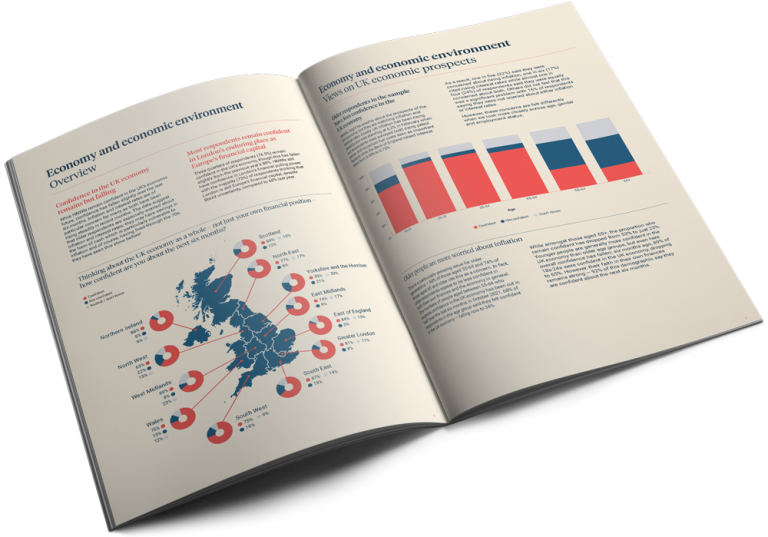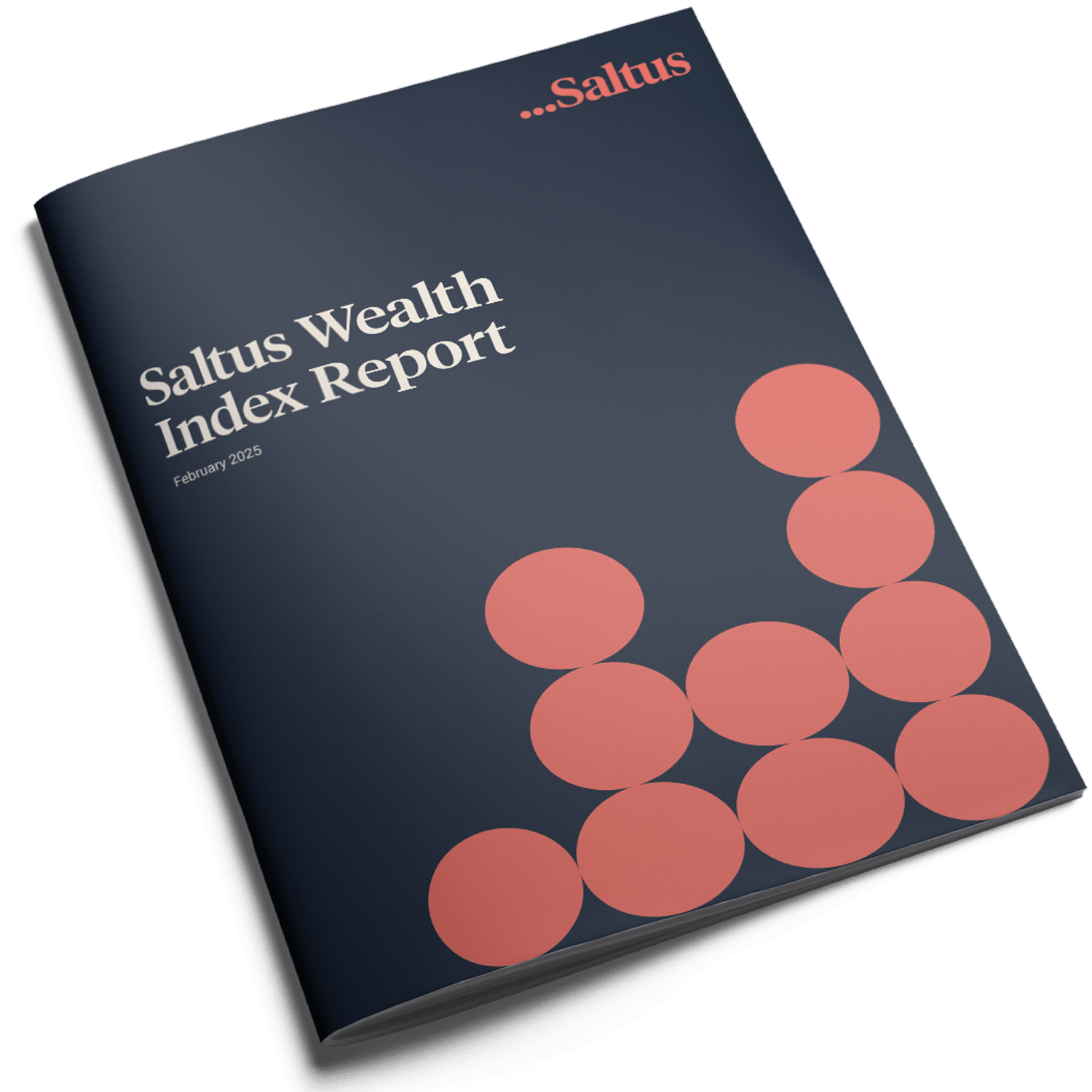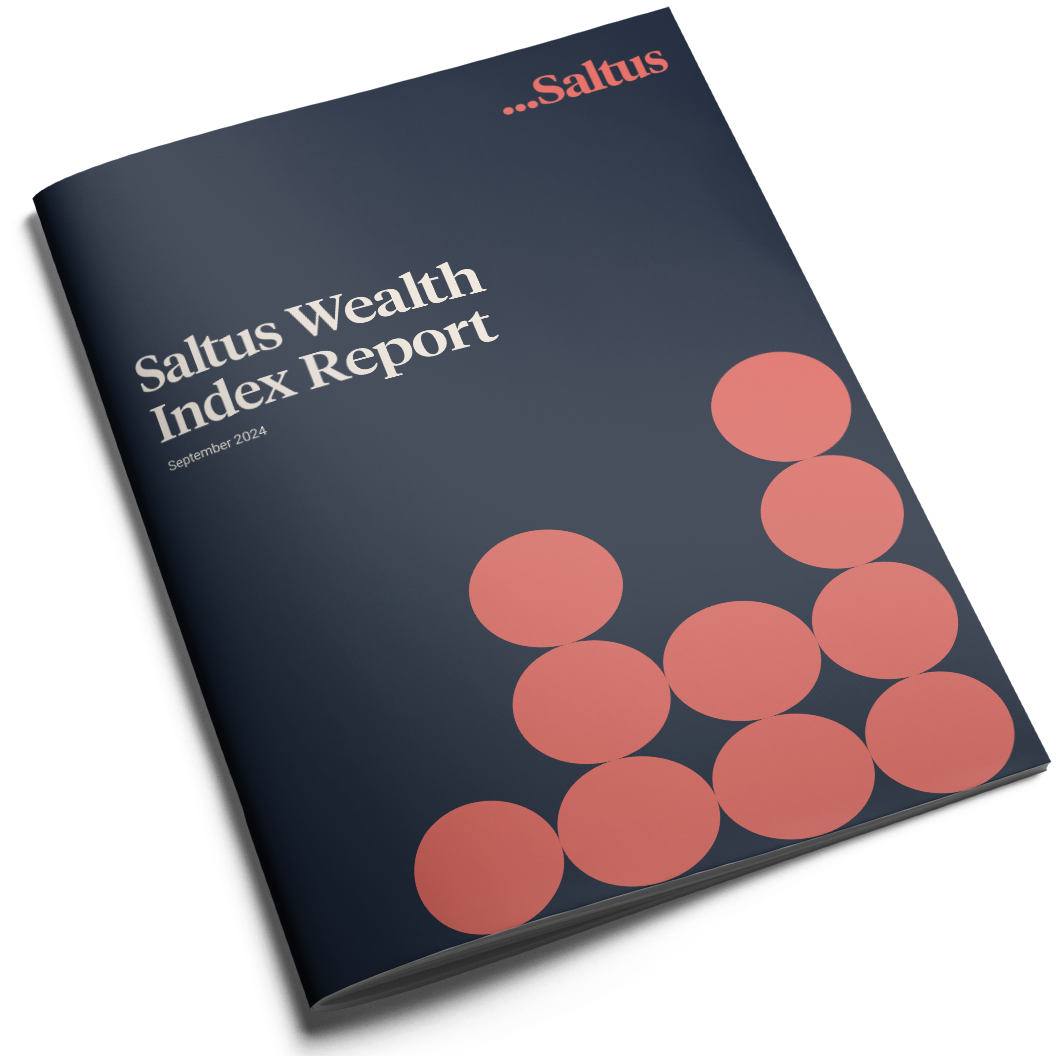Foreword

Welcome to the fourth Saltus Wealth Index Report.
The last year has been characterised by the threat of crisis, which subsequently has been avoided. Europe has survived the supply shock of the withdrawal of Russian gas; inflation spiked at record levels but has now somewhat retreated; and some banks failed but the financial system did not collapse. In the UK we even have had a government that has lasted longer than 44 days.
It is against this backdrop that the fourth Saltus Wealth Index Report is published.
Twice a year, working with our partners Censuswide and Dr Michael Peacey of the University of Bristol, we survey the views of more than 2,000 high net worth individuals (HNWIs) whose continued commitment to the UK will be needed for the country to succeed in the coming decades.
The Saltus Wealth Index figure, tracks how our respondents feel about the British economy and their own prospects. It has recovered from 59.5 to 60.9 but is still some way off the peak confidence we recorded 18 months ago.
However, this headline reading disguises a number of concerns. HNWI respondents are worried about inflation and interest rates. They are concerned about planning for the future as well as the challenges of having to support family members and dependants as economic pressures persist. The survey reveals that while financial meltdown may have been averted, the people in our sample are by no means sanguine about the future.
I hope you enjoy this report and that its findings are useful.
Commentary

The Saltus Wealth Index Report synthesises some of the key information gathered from the questionnaire and provides a simple barometer of the subjective confidence and concerns that over 2,000 UK high net worth individuals (HNWIs) have relating to the UK economy. The Index ranges between 0 and 100, with higher values describing higher confidence in (and fewer significant concerns with) the UK economy and personal finances.
The Index currently stands at 60.9, which represents a very marginal increase compared to the previous Index score of 59.5. This suggests that although confidence among HNWIs remains resilient, despite the fact that the challenges to household finances have continued for the last six months, a recovery to the level of the first index (67.7 in May 2022) may take some time.
It was apparent from the last Index that many HNWIs will have anticipated some of the challenges of the last six months – for example, inflation remaining high and interest rates rising consistently to a level not seen in over 15 years. However, the view that neither of these will fall as fast as some previously believed is restraining confidence.
One of the measures that has driven the Index up the most is HNWIs’ growing confidence in London; 66% of respondents now believe London will remain Europe’s financial capital, up from 62% on the last survey. While these feelings have recently been supported by data suggesting London’s economy is the best performing in the UK, economic uncertainty has meant a cautious approach to hiring in the sector. The collapse of Silicon Valley Bank earlier this year served as a reminder of the complex interdependency and fragility of the global finance system.
Although HNWIs may be insulated from the most severe impacts of the cost-of-living crisis, there is some commonality to the general themes of some challenges. For example, although consuming very different bundles of goods, many HNWIs will also be feeling the impact of inflation – as expensive things have been increasing in price too. For instance, those people in our sample who have made sacrifices to independently educate their children may be experiencing it through school fees, which are increasing at the fastest rate since 2009 – and many will be acutely aware of possible future rises as VAT on these fees become a political target.
This group does have some opportunities. While some investments have seen poor performance over the last six months, others have performed well over the same period. However, the current mix of challenges and opportunities mean that making appropriate decisions to protect their wealth will be especially important for many HNWIs, and so it is perhaps unsurprising that the only measure in the Index to fall significantly corresponds to the increased anxiety caused by money (64% of respondents now agree that money makes then anxious, up from 59.6%).
Executive summary

The Saltus Wealth Index stabilises
The Saltus Wealth Index was created to provide a simple barometer of the financial confidence and concerns of a sample of the UK’s high net worth individuals (HNWIs).
The Index is created by combining HNWIs’ responses to nine questions which focus on prospects for their own wealth and the wider UK economy, including the impacts of inflation and tax, as well as geopolitical events to create an overall ‘confidence’ score that is set between 0 and 100.
The Index currently stands at 60.9, which is a marginal increase on the last Index of 59.5 (measured in January 2023) but is still considerably lower than 67.7 recorded in May 2022.
This small movement in the Index suggests that, while respondents are generally positive, confidence is nowhere near as high as it could be, with almost two thirds (64%) of respondents stating that their money makes them anxious, with more than one in four concerned about inflation (28%), and under a quarter admitting they are concerned about potential tax changes (22%). However, this marginal increase in overall confidence amongst HNWIs does indicate that confidence may have stabilised, and they are feeling more optimistic about their prospects now than earlier this year.
Confidence in the economy
The UK economy is still grappling with stubbornly high inflation and higher interest rates, but positive sentiment regarding prospects for the UK economy is actually strengthening among HNWIs.
Our research has found that 71% of respondents have confidence in the resilience of the British economy compared to 67% who answered the same question for the previous Wealth Index report, which was published six months ago.
The data also highlight that 82% of HNWIs are feeling confident about their own wealth over the next six months.
The views expressed by our respondents chimes with recent forecasts made by the International Monetary Fund (IMF), which stated the UK is expected to avoid a recession this year and will instead achieve growth of 0.4%.
The end of the Lifetime Allowance
The abolition of the Lifetime Allowance (LTA) was one of several key announcements made by Chancellor Jeremy Hunt during his Spring Budget.
Much was made at the time as to whether his decision would have any real desirable impact on the economy, but these findings suggest that the outcome may be positive.
This latest Wealth Index survey took place after his announcement and reveals that nearly 70% of HNWIs would consider working for longer as a result of the LTA change, and 35% said they would consider going back to work.
Hunt’s decision was also taken partly to bolster the country’s healthcare system by removing the ‘pension tax trap’ senior doctors or surgeons found themselves in, which often encouraged them to retire early. It appears to have achieved its aim as 76% of healthcare workers who responded to our survey said they would consider working for longer.
The Chancellor’s announcement is also a boon for the retirement plans of HNWIs, with the majority now planning on increasing their pension contributions. The age group making the most of these changes are those aged between 35 and 44, with 67% looking to boost the amount they can put into their pension pots. The findings suggest this is a preferred tactic for a comfortable retirement for HNWIs under the age of 55 compared to those over 55 years old, where only 35% said they planned to increase their contributions.
The cost-of-living crisis and supporting adult dependants
With no imminent signs of the cost-of-living crisis abating, the trend for HNWIs to support their adult children financially continues.
The latest data reveal nearly a quarter of HNWIs are supporting children or dependants as a result of the current economic environment.
The results show that one in five (22%) are reducing pension contributions in order to provide this support, with the data also revealing that 20% of respondents have tapped into housing equity or sold another asset to use the funds to support their children.
With the Bank of England accompanying its most recent UK interest rate hike with a warning that UK price inflation is likely to be higher for longer, driven by food costs, the money HNWIs are handing over to their adult children is predominantly being used to pay household bills.
The latest Wealth Index survey found that, of those who are supporting their adult children financially, 32% help with groceries, 29% give money to help with energy bills, 23% do so for mortgage payments and 20% assist with rent.
Economy & economic environment

Overview
Confidence in the UK economy is in recovery among HNWIs
Our research shows that 71% of HNWIs have confidence in the UK economy, an increase from 67% when the question was posed for the last report in January 2023.
The latest data also found growing optimism among HNWIs concerning the UK as a financial centre, with 66% citing they believe London will remain the financial capital of Europe compared to 62% last time. The risks posed by instability in the global banking system are, however, a worry for many, with one in five HNWIs saying it is their biggest concern when thinking about their own wealth.
Thinking about the UK economy as a whole – not just your own financial position – how confident or unconfident are you about the next six months?
- Confident
- Not Confident
- Neutral / I Don't Know
Economic confidence recovering
The oldest HNWIs are the least confident in the UK’s economic prospects but there has been a sharp rebound in this confidence from the lows reported six months ago. Some 36% of HNWIs over the age of 55 are ‘confident’ in the UK economy, more than double the 16% recorded in the last survey. Only 9% of respondents in this age group are ‘very confident’ on this measure, at the bottom of the league table of all age groups, although this has risen sharply from an all-time low of 3% previously.
Male respondents continue to have greater confidence in the UK economy than female respondents (73% of men are confident vs 68% of women) but, among women, there has been a solid increase of 7%.
Retired HNWIs remain sceptical, with just 38% expressing confidence in the economy (and just 8% ‘very confident’) compared to 74% of those not yet retired (27% of whom are ‘very confident’).
Those with greater wealth are the most confident, with a significant jump for HNWIs with investable assets of greater than £1 million (76% confidence, rising to 83% for those with over £3 million). Just over half of HNWIs with £250k-499k are confident (51%), rising to 61% of those with £500k-999k.
HNWIs who receive financial advice are the most confident about their financial prospects.
The data reveal those who have taken financial guidance within the last 4-6 months are notably more confident than others to weather economic uncertainty (88% confident, 30% of whom are ‘very confident’). This falls to 27% confidence in those HNWIs who have never taken financial advice and are not considering it and stands at 41% for those who have not taken advice in the last two years.
Confidence in UK economy by age
Confidence in UK economy by net worth of respondent
Confidence in UK economy by when the respondent last received financial advice
Risks to wealth
Inflation, taxation and banking instability seen as biggest threats to wealth by HNWIs
Inflation remains the biggest perceived risk to wealth, according to HNWIs across all age ranges. It is ranked as the number one threat (28%), followed by high energy prices (23%) and tax changes (22%). Tax is now seen as a much bigger threat compared to the last report, when 17% of respondents cited it as a risk.
Worries over inflation have eased slightly, however, down 5% (from 33%) since last time, perhaps reflecting a more positive outlook following successive interest rate rises by the Bank of England and declines in the headline rate.
Instability in the global banking system follows close behind the top three risks at 20%, following a number of high-profile bank collapses over the last six months.
HNWIs are feeling less concerned about other global or national threats, including the impact of the war in Ukraine (down to 16% from 24%), COVID-19 (down to 13% from 16%) and the threat of Scottish Independence (down to 11% from 13%).
Thinking about your own finances, how confident are you about the next six months?
Personal finance

Overview
The Government’s decision to do away with the pensions LTA has had a positive impact on attitudes to work among HNWIs.
The scrapping of the limit on how much people can build up in their pension pots over their lifetime and the decision to increase the Annual Allowance from £40k to £60k appears to have had a re-energising effect.
The latest Wealth Index survey has found nearly 70% of HNWIs are considering working for longer as a direct a result of the removal of the LTA on pension contributions (67%), rising to 76% for those who work in the healthcare sector.
Financial education is seen as the key to achieving financial success, but 54% of HNWIs agree that they would have liked to have been taught more about investment and money when they were at school.
This is the first time the Wealth Index survey has looked at the link between lessons in money management and outcomes, and the results speak for themselves: almost half of HNWIs regret not investing at an earlier age because they lacked the knowledge to do so.
Nearly a quarter of HNWIs have started supporting children or dependants due to recent economic pressures.
As inflation continues to hover near a 40 year high and people continue to experience a decline in real wages, there is no indication in these results that Gen Zs and millennials will stop turning to their parents for help with bills.
Just over four in ten (41%) of respondents report being victims of financial crime, highlighting the continued threat HNWIs face from scammers, who are becoming increasingly sophisticated and are now able to access AI-driven tools.
Investments scams (often where criminals convince victims to invest in schemes or products that are worthless or do not exist) and sham romances (which involve people being duped into sending money to criminals under the impression that they are in a genuine relationship with them) are just two examples of the types of scams HNWIs have experienced.
Mortgage pressures
Mortgage rate rises continue to squeeze cashflow and leave HNWIs feeling the pinch
Nearly nine in ten (86%) HNWIs are worried about rising interest rates impacting their monthly mortgage and are increasingly concerned about the impact the repayments will have on cashflow.
Some 39% of respondents state that they have already felt the impact on their finances and 47% said they expect to feel the pinch in the coming months.
The data show those aged between 35 to 44 years old are experiencing the most pressure on their finances as a result of rising mortgage rates, with 90% concerned about the strain, although the majority stated that they are anticipating financial pressures rather than already experiencing them.
Self-employed respondents appear to face more pressure concerning their mortgage payments (93%)
than those who are employees (84%).
The majority of HNWIs (33%) said they would choose to move to a fixed rate mortgage for two years if they had to renew their current deal, as this would allow them to budget better and manage cashflow as they attempt to ride out the cost of living crisis. The second most popular option would be to move to a base rate tracker mortgage (24%).
"When advising clients on how to deal with increasing mortgage pressures, everyone experiences completely different circumstances and will have many different factors to consider. However, speaking in general terms, those in the 35-44 age bracket are less likely to have ever known higher mortgage rates and so it is not something they will have been previously needed to be concerned about. That being said, as mortgage rates continue to increase in the short-term this age group will likely struggle more as they may have less disposable income than those in the older age groups. So, if looking to re-mortgage, people may want to explore various options such as term extensions, consideration of partial interest-only, partial repayment, or using any savings to lower loan-to-value ratio (LTV) if possible."
Gianpaolo Mantini
Chartered Financial Planner at Saltus
Imagine a scenario where your monthly mortgage payments on your home or rent payments have increased significantly due to rising interest rates, how would you finance your payments / repayments?
Lifetime Allowance, pensions & retirement
Removal of LTA on pension contributions sees nearly 70% of HNWIs considering working for longer
When asked if the removal of the LTA and the increase to the Annual Allowance – which takes it from £40k a year to £60k – would impact their plans for retirement, the majority of respondents said they would consider working for longer to contribute more to their pension pots. The data also showed 35% of retired HNWIs would consider going back to work.
Other impacts of removing the cap include over half (54%) of respondents stating they are considering moving from part-time work to full-time employment. This rises to 62% for public healthcare workers and to 90% for those that work in finance. When the policy change was first presented, it was highlighted as being particularly valuable for senior medical professionals. These findings indicate that healthcare workers are indeed making the most of the change and it appears to be having the desired impact the Government was seeking. Approximately eight in ten (79%) of public healthcare workers say they will take advantage of the removal of the cap on the LTA on pension contributions, which is 35% higher than the average for respondents in other sectors.
The increase in the Annual Allowance for pension contributions has also led to a rise in the number of respondents keen to increase contributions above the previous £40k limit. Overall, 45% of our sample said they were currently making the maximum contributions to their pension pre-April 2023. However, given the recent changes, 42% now plan on making contributions over £40k with 9% looking to contribute the full £60k and 15% planning on contributing £50-59.9k.
When asked what size pension pot they think they’d need for a ‘comfortable retirement’, the average estimate was £580,557. Two-thirds (64%) of respondents are also planning on increasing their pension contributions by upwards of £250 per month, outnumbering by a substantial margin those in the sample looking to reduce their pension contributions (25%).
The age group making the most changes are those aged 35-44 years old (with 67% planning to increase their contributions), suggesting HNWIs see this as an important component of long-term financial planning. This compares to only 35% of those over 55 years old planning to make the same change.
“The results in this survey imply that we are likely to see an increase in productivity among HNWIs regardless of age following the abolition of the LTA. With more than half of respondents considering returning to work, we can see how negative pension legislation has led to unexpected economic consequences over the years.”
Phil Bevan
Chartered Financial Planner at Saltus
Action taken thinking about the Governments recent announcement to remove the Lifetime Allowance (LTA) on pension contributions
Financial and investment literacy
More than half of HNWIs would have liked to have been taught about finance and investment at school
More than half (54%) of HNWIs say they would have liked to have been taught more about finances and investment at school. The data highlight the importance of a curriculum that enables and encourages children to become wealth creators and that also makes them more confident with money.
The value placed on financial education extends past school years, with 55% of respondents saying they would have liked to have been taught about finances and how to invest before they started earning a wage.
Over a third of respondents (38%) were taught about managing money and investment by their parents or other family members, with 34% stating that they did not receive any financial education at school. This highlights how people rely on a close circle to educate them on this issue and those without this kind of support are potentially at a disadvantage.
HNWIs’ financial education
Supporting dependants
A quarter of HNWIs have started supporting children or dependants due to recent economic pressures
The latest data reveal nearly a quarter (24%) of HNWIs have started supporting children or dependants due to recent economic strains. The data show 22% of respondents have reduced pension contributions to provide financial support, despite LTA changes and incentives, with 20% having tapped into housing equity or sold another asset (also 20%).
Of those who are supporting their adult children financially, 32% help with groceries, 29% give money to help with energy bills, 23% do so for mortgage payments and 20% help with rent. Just 21% of HNWIs say they are not providing children or dependants with any financial support (and just under a third of these say this is because they have no dependants).
How parents are supporting children or other dependants
Cybercrime
16% of HNWIs have fallen victim to financial crime in the last six months
The survey shows that 41% of respondents claim they have been a victim of financial crime at some point. This demonstrates the scale of the issue facing HNWIs at a time when cyber challenges are increasing with the prospect of the rise of AI-driven techniques.
The data show the most common scams across the sample questioned for the Wealth Index report ranged from purchase scams (24%), investment scams (20%) and pension scams (15%) to phishing emails (15%) and romance scams (9%). Respondents were also targeted by fake charities (7%) and deepfakes, where fraudsters use AI technology to impersonate people and facilitate the transfer of funds (5%).
The wealthiest Britons (those with more than £1 million in investable assets) are five times more likely to be a victim of a romance scam (where victims are duped into sending money to criminals under the impression that they are in a genuine relationship with them).
The average amount lost by HNWIs to scams overall was £12.8k (up from £10.5k in the previous research) rising to £23.6k for the wealthiest respondents (those with over £3 million in investable assets).
Financial crime is also posing a risk for younger generations. Contrary to the popular belief that older generations are more vulnerable, younger people are more likely to have been scammed. 19% of 35–44 year olds and 19% of 18-24 year olds have been scammed in the past six months, compared to just 4% of those aged over 55. The average loss for 18–24 year old HNWIs was £14.2k.
These findings follow the Government’s new fraud strategy published earlier this year. Under new guidelines, a ban on cold calls for financial products, such as those relating to insurance or cryptocurrency, is recommended and could help mitigate some of these threats in future.
Retired 68 year old male from the West Midlands with a net worth of more than £1 million was contacted via an online advert and lost £100k to an “investment offer that was entirely fake”.
Anonymous survey case study
HNWIs’ experiences with financial crime
Types of financial crime
Current concerns

Overview
For the first time since the survey began, health is no longer the most prominent concern among HNWIs, it has been crowded out by other worries. The biggest concern for respondents in this survey is the decline in the economy (13%). Given the impact of the COVID-19 pandemic lessening over the past six months (3%), the continued economic challenges now appear to be more front of mind for HNWIs.
There has been a 4% rise in anxiety related to money, with 64% of HNWIs agreeing with the statement ‘my money makes me anxious’, compared to 60% in the previous survey. Women were also found to be 10% more anxious about money in comparison to the previous study six months ago, moving from 56% in January to 66% in this study.
The economic turmoil over the last year appears to have prompted a return to inheritance tax planning with just under three quarters (73%) of HNWIs having measures in place.
HNWIs’ biggest worries
Biggest worries
Economic weakness is the now the biggest worry and has overtaken health for the first time since the survey began
Worries about the economy persist, as 13% of respondents in the survey said they were concerned about the economy, compared to 11% for the last report. Strikingly, nervousness about the economy has relegated worries around health to second place for the first time in this report.
Health as a primary worry has dropped to 9% in comparison to 12% in the last survey. There has been a gradual decrease in health as a top concern, with 29% worried about health in the second report (May 2022) and 27% rating it as a top concern in the very first report (October 2021). Other more pressing anxieties about finances and the economy seem to have impacted this switch in focus for HNWIs.
This order only reverses in the 55 year old and over age group, for whom health remains their biggest worry (12%), marginally higher than a decline in the economy (10%).
Anxiety about money
Money continues to be a driver of anxiety for Britain’s HNWIs
Almost two thirds (64%) of HNWIs agree that their money makes them anxious, a rise of 4% compared to six months ago. The most anxious are respondents aged between 45–54 (69%) while the oldest HNWIs (aged 55+) are the least anxious, with just 41% saying it makes them feel this way.
Women are slightly more anxious about money than men (66% of women vs 63% of men) and this anxiety among women has increased 10% from the last survey, rising from 56% in Winter 2022.
However, while money might make them anxious, the vast majority (84%) of HNWIs also see it as a source of freedom.
Inheritance tax planning
Inheritance tax planning is back on the agenda, with three quarters of HNWIs having measures in place
There has been no material change in those with inheritance tax planning measures in place (72% from 74% in the previous survey). The high number of respondents with plans in place reflects a strong desire to protect and pass on their wealth for future generations.
The latest Wealth Index survey found only 8% of HNWIs are yet to put any measures in place, although they do plan to at some point, and only 2% do not plan on taking any measures at all to mitigate the impact of inheritance tax.
The most popular measures chosen by respondents include 64% of HNWIs who either already have passed on (28%) or plan to pass on (36%) some of their wealth to friends and family as gifts, and 65% who either already have bought (24%) or plan to buy (41%) a funeral plan.
Just 13% of HNWIs have no current plans to pass on their wealth. In terms of those who currently have measures in place to pass on their wealth, six in ten (61%) of HNWIs plan to leave money to charity (36%) or have already (25%) made a gift to charitable causes as part of their inheritance planning.
“There are many reasons why we may be seeing stabilisation in the number of people considering inheritance tax planning. It could be the aftereffects of the pandemic as well as a growing sense of wanting to protect inheritance for children and grandchildren. But it could also be associated with frozen thresholds and rising property prices, particularly around the time of the pandemic, which have meant more people are in IHT territory than previously. With thresholds frozen until 2027/28, we expect to see continued interest in this for the next few years.”
Megan Jenkins
Chartered Financial Planner at Saltus
Do you have any measures in place to address inheritance tax / increase the tax-free assets that you hope to pass on?
Methodology

- 2,005 UK respondents (ages 18+) who have £250k+ investable assets – including a full breakdown by age, gender, regional location, city location, number and age of children, number of dependants, marital status, employment status and level, hours worked per week, industry of employment, private versus public sector, net worth, mortgage status, assets and the level of financial advice they have received.
- Censuswide (Censuswide abides by and employs members of the Market Research Society, based on the ESOMAR principles).
- Carried out online between 24 April and 28 April 2023.
- Some of the figures in this report have been rounded to the nearest whole number. This means that in some cases the total value of a graph will be above or below 100%. The original data provided by Censuswide included data accurate to 13 decimal points. The data has been rounded, where relevant, to present the clearest picture to readers of this report.
The formula which drives the Index is as follows:
This is the sum of the nine measures outlined below, Mi multiplied by their corresponding weights, wi.
- Confidence in respondent’s own finances
- Confidence in UK economy
- Proportion of respondents who are not concerned by either inflation or interest rate rises
- Confidence in London remaining as a financial centre
- Anxiety about money
- Belief in the freedom that money can give
- Lack of confidence in ESG investments
- Belief that taxation is too heavy or too light
- Concerns about UK political or geopolitical events
About Saltus
How we can help
Saltus is a wealth management company that combines empathy and intellect in equal measure. We help our clients achieve their goals in life through expert financial planning as well as providing sharp focused investment management. We started life as an investment management firm in 2004, yet over the years we saw that providing high quality investment management is just one of the ways we can help people achieve their aspirations. Saltus Financial Planning was launched in 2015, with the aim of being an industry leader in providing financial advice. Saltus now employs more than 200 people, and we have the privilege of looking after over £3bn for our clients.
Saltus Financial Planning Ltd is authorised and regulated by the Financial Conduct Authority. Information is correct to the best of our understanding as at the date of publication. Nothing within this content is intended as, or can be relied upon, as financial advice. Capital is at risk. You may get back less than you invested. Tax rules may change and the value of tax reliefs depends on your individual circumstances.
More indexes...
About Saltus?
Find out more about our award-winning wealth management services…
Winner
Best Wealth Manager
Winner
Investment Performance: Cautious Portfolios
Winner
Top 100 Fund Selectors 2024
Winner
Best Places to Work 2024
£8bn+
assets under advice
20
years working with clients
350+
employees
97%
client retention rate




